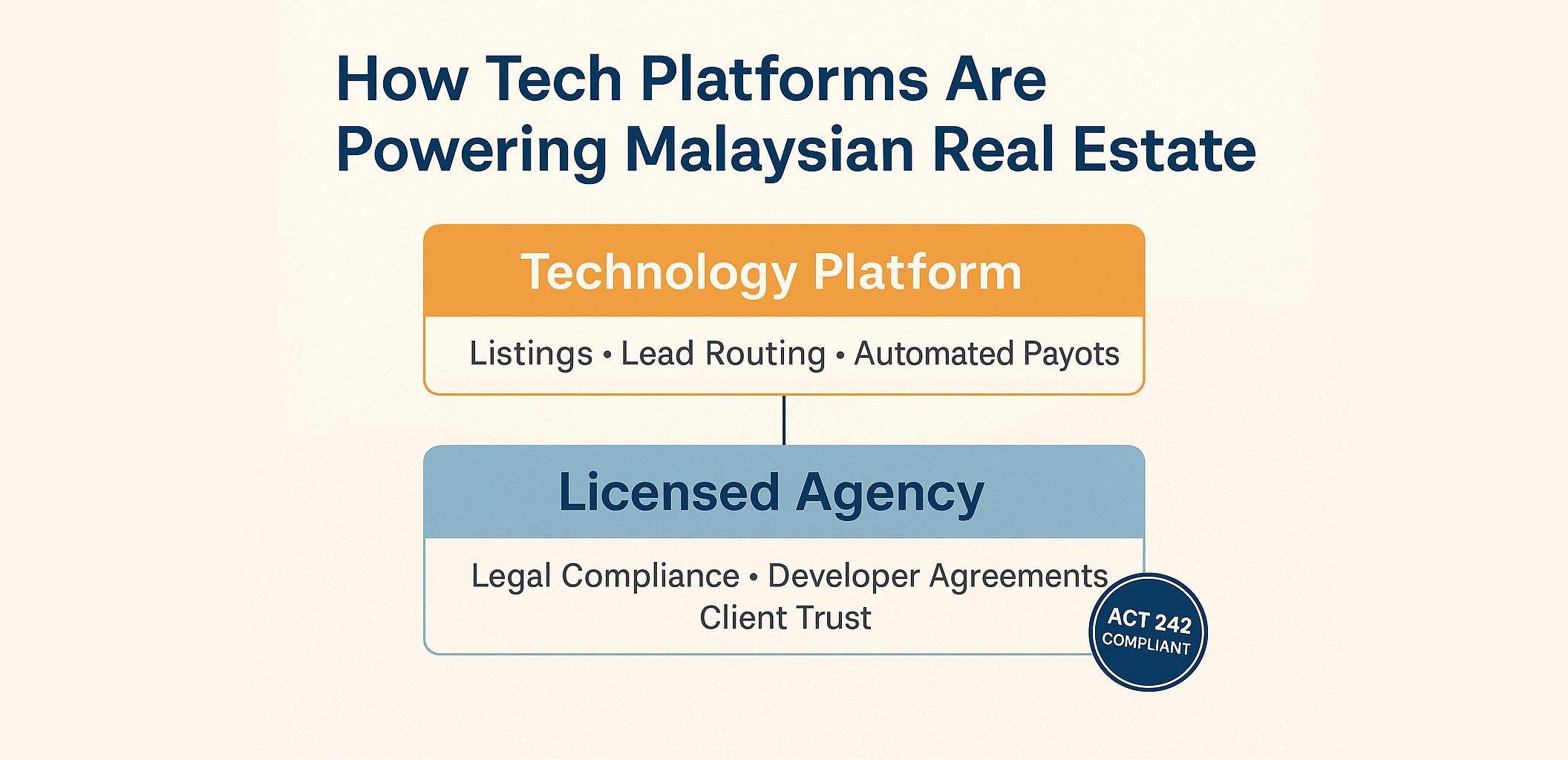How Tech Platforms Are Powering Malaysian Real Estate

A transformation is reshaping Malaysian real estate. A new generation of firms — legally registered as traditional agencies — are in reality operating as technology platforms.
They’re not just using digital tools; they’re rebuilding the industry’s infrastructure — redefining how listings, agents, and commissions move through the market.
This hybrid model — combining regulatory compliance with digital scalability — is becoming the foundation for long-term growth in Malaysia’s property ecosystem.
1 · The License — From Compliance Checkbox to Strategic Moat
Under Act 242, Malaysia’s Valuers, Appraisers, Estate Agents & Property Managers Act 1981, only a licensed estate agency can legally collect or distribute commissions from property transactions.
What many see as a compliance hurdle is, in reality, a structural advantage.
For technology-driven firms, this creates two possible routes:
- Partner with a licensed agency, or
- Become one by registering with the Board of Valuers, Appraisers, Estate Agents and Property Managers (BOVAEP).
By doing so, these firms turn a regulatory requirement into a defensive moat — a foundation that allows them to legally process and distribute millions in developer commissions.
In short, the agency license is no longer a mere checkbox for compliance — it’s the legal chassis that enables the platform to operate at national scale.
2 · The Engine — A Two-Tiered Architecture for Scale
The modern property firm now runs on a two-layer architecture that separates compliance from scalability:
| Layer | Role | Function |
|---|---|---|
| The Foundation (License) | Legal Compliance | The licensed entity manages developer contracts, client representation, and trust accounts, ensuring all activity complies with Act 242. |
| The Engine (Platform) | Technology & Distribution | The software platform manages listings, lead flow, agent collaboration, co-broking, and automated commission payouts. |
Together, these layers ensure every transaction is both legally valid and digitally seamless. The license protects the business; the platform powers its growth.
3 · The Hybrid Advantage — Four Levers of Growth
This hybrid structure unlocks four critical advantages for forward-looking firms:
- 1. Unlimited Scale
The platform can onboard thousands of external agents and agencies, transforming a single brokerage into a nationwide sales network. - 2. Exclusive Inventory
Because the company is a licensed agency, it can sign direct agreements with developers and access exclusive project listings. - 3. Radical Efficiency
Automation handles lead distribution, co-broking, and commission splits — reducing operational overhead and minimizing errors. - 4. Built-in Trust
All transactions flow through a licensed entity, ensuring BOVAEP and LHDN compliance while establishing long-term credibility with developers and investors.
This fusion of legal compliance and platform scalability allows the agency to grow faster, leaner, and safer than traditional models.
4 · Winning Over Investors — From Service to Platform
Traditional real-estate agencies often face valuation bias, seen as people-dependent service firms with limited scalability.
The hybrid model changes this perception entirely. To achieve tech-level valuations, a firm must demonstrate that:
- 1. Software Is the Core
The platform functions as the indispensable operating system of deal-making — controlling listings, collaboration, and commissions. - 2. Profits Are Platform-Driven
Revenue scales through network effects and transaction throughput, not headcount. When income grows independently of agent count, the firm operates like an exchange, not a brokerage. - 3. Compliance Is a Competitive Edge
Act 242 restricts commission handling to licensed agencies. That regulatory barrier, when paired with proprietary technology, becomes a long-term competitive moat.
Once these conditions are proven, investors begin to value the company as a platform business — not a traditional service firm — unlocking higher multiples and stronger institutional confidence.
The Bottom Line
The future of Malaysian real estate belongs to firms that treat the agency license as a launchpad, not a limitation. It’s the legal foundation for a high-performance digital platform — one that can scale nationwide while remaining fully compliant.
The next market leaders won’t be those with the largest offices or billboards. They’ll be the ones who build legally robust, technologically indispensable platforms that connect developers, agents, and data under one compliant ecosystem.
The license is your anchor. The platform is your amplifier. Together, they redefine the business of real estate.











































































































